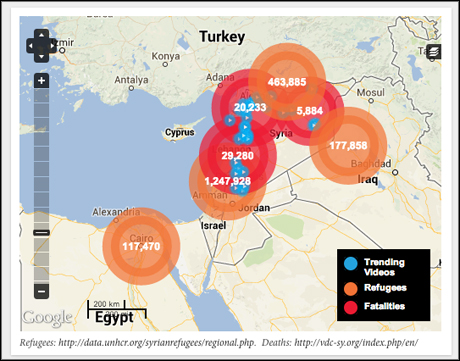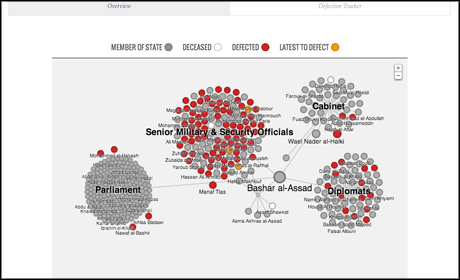
Syria Deeply, a digital-first news portal founded to focus on the stories and context of the Syrian conflict, ran a Google+ Hangout with US Secretary of State John Kerry on Tuesday September 10 as part of the ongoing effort to supplement traditional news sources and provide a greater degree of context to the crisis.
Site founder Lara Setrakian was joined by Nicholas Kristof of the New York Times and Andrew Beiter, a social studies teacher and a regional education coordinator for the Holocaust Memorial Museum, in asking Kerry questions submitted by students and teachers around the US and crowdsourced through social media.
"From the classroom we get some of the best questions," Setrakian, an experienced broadcaster, told Journalism.co.uk. "This is standard journalism but a much more collaborative approach and I believe we would do more good from having a broader conversation than hogging all the time to ourselves."
Google+ Hangouts have proven to be an effective method for Syria Deeply, launched in 2012, to conduct and broadcast interviews, said founder Lara Setrakian, having conducted interviews with academics, activists and ambassadors through the platform and posting them on the Syria Deeply website.
"The whole point in this exercise is to ask questions on everyone's mind," she said, "questions that are very relevant and that are most important that cover the critical issues. I can do the critical issues but what better way to understand what's on people's minds than to ask them."
Syria Deeply's background
The portal uses visualisations and other digital tools to "redesign the user experience of the Syria story" because founder Lara Setrakian, "didn't think that we were optimising for knowledge", she said.

Screenshot of Syria Deeply's conflict map
Alongside visualisations on the context and history of the conflict – including a multimedia conflict timeline, an interactive defection tracker (below), and a map of refugees, fatalities and trending videos (above) made in collaboration with Ushahidi – the homepage also includes original reporting and op-ed articles, podcasts, videos, a curated Twitter feed and links to stories from third parties.
"When Lara started it, the idea was to fill gaps in the mainstream media with regards to Syria coverage," Karen Leigh, managing editor of Syria Deeply, told Journalism.co.uk. "To fill these holes and to really use more of a citizen voice in the reporting."
While the news team's ability to source stories has become more difficult as the situation in Syria has deteriorated, the nature of the conflict means that there are constantly new sources of information to identify and verify.
"Syria is unique as a conflict in that it's a conflict in the age of social media," said Leigh, who had been advising on an informal basis since summer 2012 and joined the team full-time in January.

Screenshot of Syria Deeply's interactive defection tracker
"It's unique in that these activists on the ground, who aren't particularly wealthy, have an iPhone with a good camera and have the ability to run and upload it to YouTube two minutes later. We have pictures that we wouldn't be able to get if it was a westerner with a camera standing around somewhere, three villages away, trying to get somewhere to shoot two minutes of film that might not ever see the light of day.
"So it's a very immediate conflict. Something might happen and then two minutes later you see it and you see it close up, from 50 different perspectives. That's made it an extremely interesting story to cover, it gives us a lot of material to work with and to sift through but our model can be applied elsewhere."
Pakistan, Iran or Afghanistan are other countries where a similar model could be applied, said Leigh, or the focus could be re-applied to global issues such as the environment or nuclear disarmament. Setrakian said News Deeply, the parent company of Syria Deeply, had already been approached to make a Congo Deeply and Myanmar (Burma) Deeply.
"Hopefully by the time we get to the next one it'll be this well-oiled machine, we'll know exactly what the platform and content will look like," said Leigh. "The issue will be different but the process will be very similar.
"The idea is to do these one-issue, in-depth news portals and use it to source people on the ground in new ways so it can be applied to any issue."
"We'll have local partners, we'll have knowledge partners, we may have media partners," Setrakian said. "These are projects we believe in and we're going to bring together the right coalition of folks to make it happen."
Free daily newsletter
If you like our news and feature articles, you can sign up to receive our free daily (Mon-Fri) email newsletter (mobile friendly).
Related articles
- Protecting independent journalism, with Lexie Kirkconnell-Kawana of IMPRESS
- Why Australia's bid to make big tech pay for news failed: views from an indie publisher
- Five key takeaways from the UK select committee on the future of news
- From Reuters to The New York Times, Big Oil pays 'most trusted media brands' to push greenwashing
- Finding purpose for AI in the newsroom









